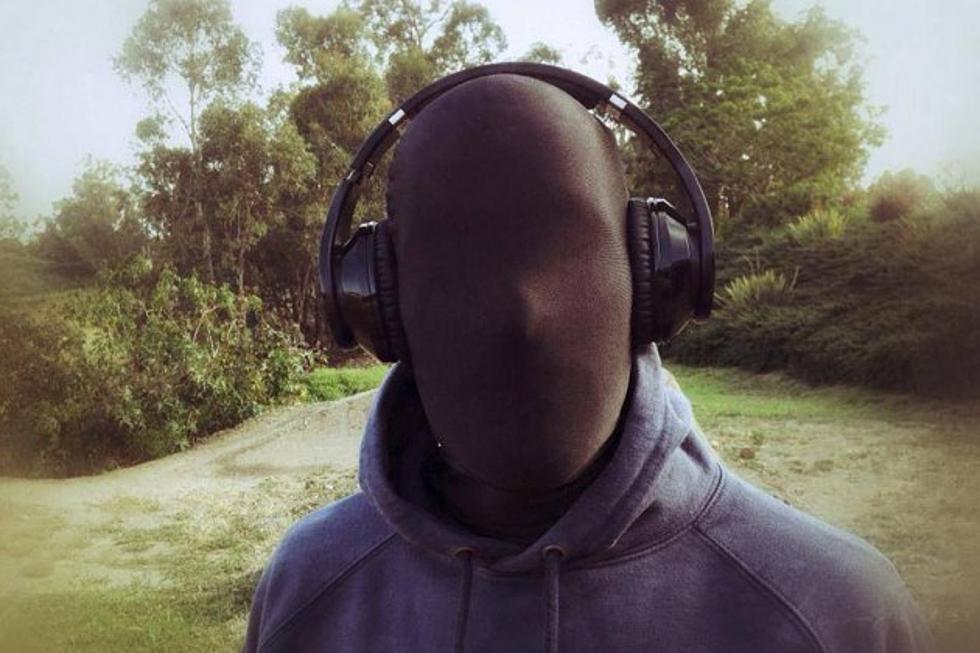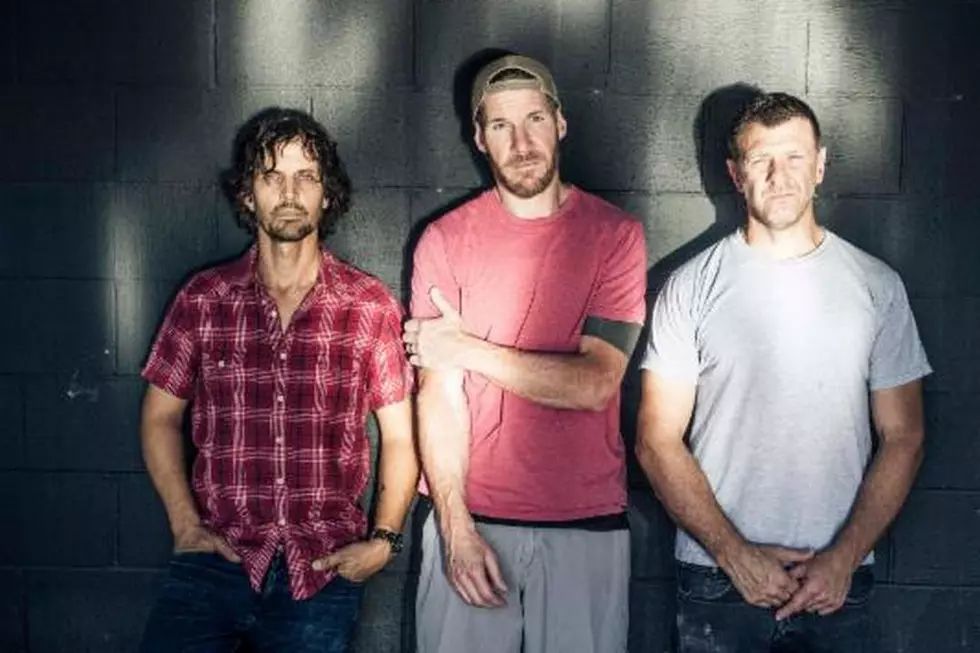
Future User’s Tim Commerford + Jordan Tarlow Talk ‘#SteroidsOrHeroin’ Disc, DIY Videos + More
Up until just recently, Future User appeared to be an anonymous band led by a masked figure known as "S.W.I.M." (see above photo). But with the release of the brand new 'Mountain Lion' video, it is now confirmed that Rage Against the Machine's Tim Commerford is the man under the black mask and his musical partner on the project is guitarist/multi-instrumentalist Jordan Tarlow. Loudwire had a chance to speak with Commerford and Tarlow about Future User, their eye-catching video work and their plans for the future. Check out the chat below:
Let's talk about the project. How did the two of you come to work together?
Tim Commerford: I rented a place that was right by his house / studio and we got to know each other and we talked about making some music one day and we -- it took a long time but finally that happened. I started going over there, writing songs and tapping into some influences we hadn't had an opportunity to ever before. That was it.
There's such an interesting variety of sounds on here. It's aggressive, but it also grooves. Can you tell me about how long it was before the creative direction got formed of what you wanted to do?
Jordan Tarlow: Other than the guitars, it came pretty fast. We wanted to do something in song forms that we'd never done before, which was we both did guitar bands so we started without that. We wanted to do really heavy percussion, so that was where everything started from and Tim had brought in some bass lines and we started working with the synths. All the synths for the most part are really old ones I've had for a long time and most of them haven't worked in years and I've sent them off all over the country getting them fixed. The only guy who knows how to fix that one, we got that back and they were all instrumental.
Then It was time to get a singer. Tim was like, "Well, I know this guy I know that guy" and I'm like, "I heard you sing with Audioslave on the Jay Leno show once. You were singing backgrounds and it sounded good to me. Why don't you sing?" So he came back an hour later with some lyrics and they were damn good. It turns out he's got books and books of lyrics he'd written through the years. I don't know if any of them were used in any bands or not but they were all good.
Tim, as far as singing, any hesitation to step up or did it just feel right immediately?
Tim Commerford: Once that first one was out of the way it was just sort of a snowball. I was a little nervous but I just went for it. I figured if it was good, it's good, if it sucks no harm no foul. It sounded good. Jordan liked it, that empowered me and I just kept trying to do better. I started taking vocal lessons, I always loved the challenge of playing my instrument and trying to sing. It's like a Rubik's Cube -- it seems impossible but it's not.
'#SteroidsOrHeroin' is the album title, and after seeing the videos, it seems like each video is taking on some kind of injustice that's out there. Was that always the concept?
Tim Commerford: Once we started making videos, yeah. The videos became the vehicles for that. Hopefully it will continue to be. That's it, I can't help but try to educate people and try to bring to light some things I think are f---ed up.
'Mountain Lion' is the new song and video. What drew you to that?
Tim Commerford: The song is about sports and about a sporting mentality and trying to one up your competition and the video is also about that but also the song took on a new life once we started making the video and I started realizing that, you know what? This song is actually about doping. So the video is about doping. At the end of the day, the message that we're trying to get across with this journey that this guy who we call "S.W.I.M." who is sort of our superhero that we have, that ties everything together, he's on a journey. It's entertaining, hopefully, and at the end of the video the real message comes to light. And that is, don't be distracted by doping in sports and don't think that doping in sports is actually important enough for presidents to talk about. It's really not.
What's really important is something like heroin. We're over there in Afghanistan funding drug lords to grow poppies and now heroin is on the rise here in America on the highest level ever killing people here, incarcerating people here. To me, that's a real issue. That leads to the name '#SteroidsOrHeroin.' What's more important?
In the 'Mountain Lion' video 'S.W.I.M.' gets identified at the end. Was it always going to be you?
Tim Commerford: The plan was to lay a foundation and then come out after we felt comfortable with OK, this is what we've been doing. And I really didn't want to use Rage as a way to get my foot in the door. I didn't want to do that. I wanted to be able, if I was going to do that, I wanted there to be a foundation and there is now. Sort of, the plan is moving along the way we intended it to move along now.
Jordan, tell me about S.W.I.M. and the initial idea and concept, what it would look like, the image you wanted to portray in the video.
Jordan Tarlow: We must have gotten a handful of songs together by then and Tim walked in in this mask one day and just sat there in the studio refusing to take off the mask. It just became a period of where he was wearing that thing everywhere he went. It was some kind of expression and it became a perfect vehicle like, 'Hey that's a great way to make these videos and commenting on life.' If you're not working on music and you turn on the computer and you open up and see the news and you're like, 'What the hell now?' This was a great vehicle to have him be anybody.
Tim, the stunt at the end, setting yourself on fire. How?
Jordan Tarlow: It was part of the reason for the reveal at the end. If you're going to burn yourself, and you're really doing it.
Tim Commerford: I was gonna wear the mask.
Jordan Tarlow: He didn't want to take credit for it!
Tim Commerford: Some friends who were like, dude, you have to take the mask off and do it for real if you're going to do it. I did it and that was what they call a "skin burn" which is the hardest type of burn to do. It's easier when you have clothes on and a mask on to do it, and it's really not that detail orientated. You put some stuff on your skin, then lighter type fluid on your skin and you light yourself on fire. When you start to burn you hopefully get put out.
Oh man.
Jordan Tarlow: Everything in every video is real. A friend of mine said, 'Does everything he do have to be for real?' I was like, 'That's the fun of it.' Making these videos, going into the supermarket with the mask on and then injecting stuff into the food. That was real. It was in the middle of the day. Torturing John McEnroe [in the 'Clockwork' video], he really got waterboarded and probably for much longer than the guys in Guantanamo. He was screwed up after that.
Tim Commerford: It's fun to research stuff like that, too. I'm the type of person where it's like, hey waterboarding. Guantanamo. That's messed up, man. I wonder what waterboarding is all about, then you research it and find out how to make a water board and then you find out the horrible stats of the people in Guantanamo, the 800 people that got put in there and only seven people got charged with a crime. Terrible s--t, it just makes you more and more mad. Then I'd go ahead and do the waterboarding and try to make that statement, that's cool and the same with 'Mountain Lion.'
Doping, I've never doped before. Get on the Internet, how do you dope? What's blood doping? How do you do it, what do you do? Then literally doing it, which is what I did. I didn't just -- it wasn't movie magic, that was the real thing. We're making our own videos, we don't have a film crew. We're not able to fake it. So the easiest way to make a cool video if you want to try to show something. Ok, well how do you dope? How do you do injections? How do you blood dope? The easiest way is to just do it. So I did it. I took my blood out, put my blood back in and got some HGH, injected it into my stomach even though you're supposed to be on it a long time, I only did it once, but still - I did it. It felt good. It feels good to make real videos and I only wish that I could have lit myself on fire for real. I did, but I'm still alive.
Another thing in that video, which I thought was cool, especially living in L.A., was that it was shot all around Los Angeles as you were skateboarding all over the place?
Tim Commerford: That was neat. That's what the video was -- it's a journey and it really feels like that when you watch it. Living in LA, it's such a big huge place and there's so much of it. It's so much fun to be in Chinatown, or Downtown L.A. I was in Lynnwood, I was in Huntington Beach. I was in Venice. It's an incredible place. It's an incredible journey.
You mention the waterboarding with John McEnroe. Then we see Lance Armstrong pop in the 'Mountain Lion' video as well. The connection there? How did they end up getting a chance to be in the videos?
Jordan Tarlow: They all mountain bike together.
Tim Commerford: Through cycling is the true connection. With me and McEnroe and me and Lance, pain and suffering is also the connection. If you're a cyclist, that's what you do. You suffer. The videos to me are painful and those guys are -- they write their own rules and they do it the way they want to do it and they felt like perfect people to be in it. I feel blessed that they agreed to do it.
'Medication Nation' is another of your new songs. Can you talk about that track?
Jordan Tarlow: That was probably the first one with singing on it. It went from an instrumental to a real song. Then it was remixed by Fotech and we changed it around from some ideas we got from him, so it's actually a remix of his remix. It's definitely a cool journey, that track.
Tim Commerford: It's neat that it's an electronic track. It's got an eight note droning bass line, which is something you don't really hear in that kind of music I like. It's got that bitchin' acid keyboard breakdown in it, which is awesome. Again, it was the first song we put lyrics and vocals on and sounds good. It was written about this drug culture we live in, whether it be recreational drugs or pharmaceutical drugs or the drugs that we're taking that we don't realize we're taking that are in the foods that we eat.
'Clockwork' was the first song people were introduced to. Can you discuss that track, as well?
Tim Commerford: That song is actually based on the rules of dubstep music. That song is at 70 bpm?
Jordan Tarlow: No, 140.
Tim Commerford: So it's at 140 beats per minute, key of G, dubstep. We geeked out on some dubstep music and went, OK let's use those rules and make a song. We did.
Jordan Tarlow: It became something completely different because we had done that one and just left it in a skeletal form, it was just bass and drums. It was real busy and we chopped it up a bit and came up with something and Tim's friend Brendan O'Brien, who plays guitar, popped by and we were like, 'Want to play on this?' So his guitar totally changed it and took it in another direction.
Tim Commerford: Yeah. So it's got like a Zeppelin, acoustic guitar rhythm thing and crazy tuning.
Jordan Tarlow: So all of a sudden it just sounds like Jimmy Page and we had no intentions of going anywhere in that direction, but we ended up loving it.
Tim Commerford: Then you make the video and the video is about GMOs and lyrically maybe that's not what I was thinking when I was writing the lyrics at the end of the day. Oh, that's a different one. The video is about Guantanamo and maybe that's not what I was thinking about when I write the lyrics, but now that we've made the video -- it's like, oh yeah that's what the lyrics are about. It feels perfect.
Jordan Tarlow: It's awesome to be able to throw stuff down these days and just have these thoughts and just go with them immediately. There are no teams of, well you know the video guys got this treatment he wrote for your song and blah blah. You're sitting there bored in the studio, whether he's waiting for me or I'm waiting for him to do something. You just go, 'Hey! What if we did this? What if we waterboard John McEnroe.' Then we go, 'Why not? Let's go do it right now.' No camera crews. You just call your friend, go over and build a table and ...
Tim Commerford: And torture him for real. Again, everything we did was real and I really waterboarded him and gave him a way to signal me if it got out of hand and I always went way past the signal to where everyone that was there, Jordan was there and was like, 'Dude! Stop!'
Jordan Tarlow: It was uncomfortable.
Tim Commerford: I was just continuing as he was choking water. I would pull the towel off and you can see that in the video then I'd pour water down his throat as he's trying to get his breath and he was moved by it. He went from a person who maybe felt like there was justification in doing that to some people in Guantanamo to a guy who right now, I think he'd be the first to tell you that no one should ever have to go through that.
The whole message in the video, what if this was someone that you knew or someone that you loved ...
Tim Commerford: Right. How would you feel about it? Again, only one person has ever been convicted of a crime out of 882 people we put in Guantanamo Bay. Seven people have been charged. One person. It's horrible. We are creating terrorists.
You mentioned Brendan O'Brien coming and playing. I think he played on most of the album?
Jordan Tarlow: Yeah, he's on every song.
I know the band is just the two of you, but with Brendan coming in, once you mentioned it, was it like 'Hey wanna do another?'
Tim Commerford: That's exactly how it went down. It really refined the direction of the music whenever he would play guitar on it. We were like, 'Yeah, you know what? This is what we should be doing. He needs to be playing on these other songs too.' It was that like, 'Hey man, can you come do more?' He said 'Sure.'
Jordan Tarlow: We had a vision for this pretty early on that we wanted it to be kind of a modern prog-rock, because that where two avenues we never got to explore in bands before but we always kind of liked that stuff. So, prog rock means more than two guys.
Tim Commerford: And he's a prog rock guy.
Jordan Tarlow: And we want someone else doing something else on top of what you're doing you can't do everything yourself.
You both come from guitar backgrounds, but end up doing a lot of electronic music. What were some of the influences or touch tones that you were looking at as you went into this project?
Jordan Tarlow: I had played Tim some drum loops I was working on and he's like, 'It sounds like 'Call of Duty'! I can play bass to that!' Then he did that and I was like, 'I don't know what I can play on top of this' because I can't really play keys well but I hear this King Crimson Mellotron thing and so we just started building it up. I just love that you can just build a whole world.
Any thoughts of taking this out live?
Tim Commerford: Sure, if the need be, we'll do it.
It'd be interesting to see how everything would get pulled off.
Tim Commerford: There would be real musicians playing with the super-human musician.
Hearing this coming through your stereo speakers sounds great. How was it for you the first time hearing back the fully formed music of Future User?
Jordan Tarlow: It was great. I'm sure for Tim, being that he sang on it and he wasn't a singer before, that's gotta be a totally different experience for sure. That was fun, just seeing that for somebody. Somebody who's been in a band for years but wasn't the singer just watching that go down was really cool. For me, I don't know, we're just in the studio all the time. I'm in there all the time.
Tim Commerford: He's doing all the producing of the whole thing so he's hearing every incarnation of every song 1000 times and so it's gotta be tough. I at least have the opportunity to go home and come back. He didn't get that opportunity. It was pretty spectacular, when it got mixed to be able to go to the studio, listen to it here, make changes and get a CD to put it in the car and drive home listening to it. We both did that together, that was pretty neat.
Jordan Tarlow: That was our listening party. The car ride home from A&M or Henson Studios.
Tim Commerford: Ultimately it's a blessing to be able to make music. You ask, what are we going to do? Put the record out? Hopefully we'll make more music. Hopefully we'll go into the studio and write another song, it's so cool. It's so fun.
Jordan Tarlow: When you've been doing this for a while, you wonder if the artform is dead or not. It's just such an amazing art form that was our whole life. It'd be great to be keep being able to do it.
Lastly, you guys have already got several videos, each of them very unique and eye-catching. With a full album coming out, are you thinking of doing a video for each song on the record?
Tim Commerford: Maybe so. We have a couple of more ideas that we've thought out and that are going to be good. There's only a few more songs, so, yeah.
Our thanks to Future User's Tim Commerford and Jordan Tarlow for the interview. You can pre-order the band's '#SteroidsOrHeroin' disc at iTunes. And be sure to catch their videos for 'Mountain Lion,' 'Medication Nation,' 'Supernatural' and 'Clockwork' at the band's official YouTube channel.
Watch Future User's 'Mountain Lion' Video
More From Loudwire









